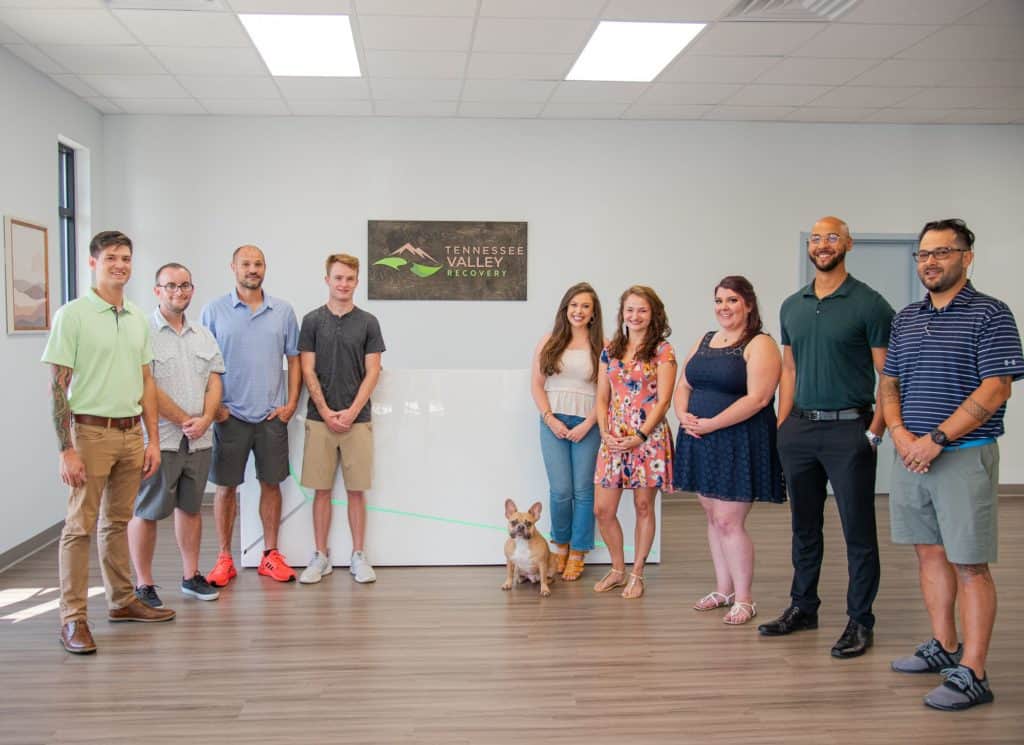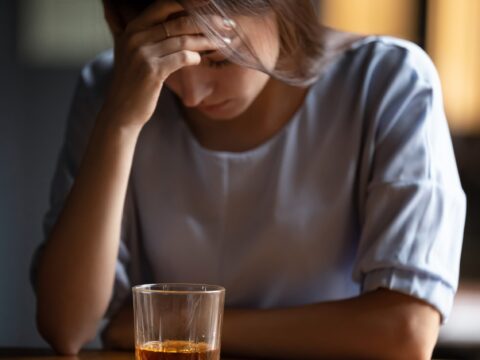Addiction Treatment Near Knoxville, TN
Knoxville is the third-largest city in Tennessee with a population of almost 190,000 people. The city is home to a bustling arts community and puts on several festivals each year. It is close to the Great Smoky Mountains National Park, allowing locals and visitors quick access to some of the most stunning mountainous views and activities in the country. This city is also home to the main flagship campus of the University of Tennessee, which boasts an enrollment of close to 30,000 students.
Despite all of the positive attributes of living near or around the Knoxville area, it is not immune to the problems of drug and alcohol addiction that the rest of the country experiences. Because of this, many people benefit from our addiction treatment center around Knoxville to find recovery and leave addiction in the past.

How Drug Addiction Impacts Tennessee
In Knox County, where Knoxville is located, there were 342 drug overdose deaths in 2020. That same year saw 200,398 people in Knox County fill benzodiazepine prescriptions.
Additionally, in 2020, there were 1,307 opioid-related drug overdose deaths across the state of Tennessee. Deaths involving heroin totaled 369 and those involving prescription opioids totaled 550. There were 827 deaths involving synthetic opioids, such as fentanyl.
In 2019, Knox County inpatient treatment admissions involving drug overdoses totaled 407. Outpatient treatment admissions involving drug overdoses totaled 1,268.
BlueCross BlueShield of Tennessee reported some alarming statistics about the damaging effects of addiction on the state:
- 5.4% of residents aged 12 and up are dependent on or abuse alcohol.
- The number of people enrolled in state-funded facilities for heroin addiction has increased by 157%.
- Approximately 221,000 Tennesseans have taken prescription drugs for non-medical reasons.
- Drugs are involved in 80% of crimes statewide.
- Approximately 800 meth labs are in operation in Tennessee.
- Each year, more than 1,000 babies are born dependent on drugs

What To Do if You Need An Addiction Treatment Center Near Knoxville, TN
Recognizing that you need help for an addiction to drugs or alcohol is the first step to getting better. Determining the exact kind of help you need is the next one. Consulting with a doctor, therapist, or other medical professionals can help you decide what type of treatment you need. Intake counselors at addiction treatment programs can provide guidance and a solid overview of your needs.
Generally, the primary treatment is detox, which involves helping the body rid itself of toxins accumulated during addiction. When detox is complete, recovery can begin. Some people enter a residential treatment program next, which requires them to live in a facility usually for at least 30 days. They receive round-the-clock care and typically move on to outpatient treatment when they complete their residential program.
For many, going directly into an outpatient program after detox provides the level of care they need. Outpatient programs include choices such as intensive outpatient, partial hospitalization, sober living homes, and holistic therapy. Recovery is an ongoing process that requires time and dedication. Studies show that the longer a person stays in their treatment programs, the more likely they are to avoid relapse and maintain long-term recovery.
A New Day Begins with Tennessee Valley Recovery
Visit the admissions page at Tennessee Valley Recovery today to learn more about our treatment plans.
Our Treatment Center Has Recovery Plans To Meet Your Individual Needs
Tennessee Valley Recovery understands that not all drug rehabs are the same. We provide multiple types of treatment in order to offer exactly what each client needs.
When you first come to us, we conduct an assessment that tells us what your specific situation and needs are. This allows us to design a tailor-made program that is specific to your needs and goals. Our treatment helps you grow in your recovery and avoid relapse–especially compared to programs that believe a one-size-fits-all approach works for everyone.
Factors we take into consideration include the length and severity of your addiction, what your treatment goals are, any previous attempts to get sober, and any co-occurring mental health diagnoses. We also consider what responsibilities you have at home, including work and family, in order to provide a schedule for treatment that aligns with them.

Types of Drug Rehab Services We Provide Near Tennessee
We offer an array of options for treatment that help us provide the flexibility needed by our clients. Services provided by Tennessee Valley Recovery include:
Intensive Outpatient Program (IOP)
Sessions take place over 3 to 5 days per week for a total of 9 to 20 hours per week. IOP provides focused care that allows individuals to return home at the end of the day.
Partial Hospitalization Program (PHP)
Sessions usually take place five or more days per week for 5 to 6 hours per day at our addiction treatment center in Knoxville, Tennessee. PHP can be an effective next step after completing a residential program. It is also beneficial when a more intensive program is needed compared to a regular outpatient program.
Medication-Assisted Treatment (MAT)
This type of treatment often proves beneficial for those dealing with addiction to alcohol or opioids. MAT combines traditional therapy with FDA-approved medications that assist with things like reducing withdrawal symptoms, lowering the risk of relapse, and providing unpleasant side effects when an addictive substance is used.
Holistic Therapy
This type of treatment addresses a person’s physical, mental, and emotional health. Types of holistic therapy include massage, acupuncture, meditation, art therapy, yoga, Reiki, and nutritional therapy. Combining holistic therapy with traditional talk therapy elevates a person’s ability to stay in recovery long-term.
Family Therapy
Addiction doesn’t just impact one person’s life; it affects the entire family. Family therapy allows everyone to express how addiction has impacted their lives, learn to communicate more effectively and learn how to support the family member in recovery. It can stop any codependent behavior and strengthen the family unit as a whole.
Eye Movement Desensitization and Reprocessing (EMDR)
This form of therapy helps many people who deal with trauma to lower or eliminate the damaging effects of past traumatic events. Trained therapists direct clients to use specific eye movements while the client discusses the trauma, which allows them to diffuse the impact trauma has on their lives.
Sober Living
We partner with sober living homes to provide access to programs that help people bridge the gap between residential treatment and returning home. Sober living homes offer a community of others in recovery from addiction and allow them a place to practice their newfound sobriety while learning to reintegrate into society.
Find An Addiction Treatment Center Around Knoxville, TN
If you are ready to take control of your life and get help for your addiction, we know how to help you. Our premier drug rehab provides several treatment options, including outpatient programs, holistic therapy, medication-assisted treatment, and sober living homes.
We offer treatment for those living around the Maryville and Pigeon Forge areas. We also treat any co-occurring mental illnesses you have in order to provide you with the well-rounded treatment you need to jumpstart your life.
Contact Tennessee Valley Recovery today and find out how we can change your life.
Our Services
- Family Counseling
- Partial Hospitalization Program In Knoxville, TN
- Rehab Near Pigeon Forge, TN
- Holistic Addiction Treatment in Knoxville, TN
- EMDR Therapy
- Equine Therapy
- Medication-Assisted Treatment
- IOP
- Mental Health Intensive Outpatient Program (IOP) in Knoxville, TN
- Mental Health Partial Hospitalization Program (PHP) in Knoxville, TN
A New Day Begins with Tennessee Valley Recovery
It is time to put your health and wellbeing first. Call us right now to learn more about how we can help you put a stop to your active addiction and begin living a life of recovery.
ContactLatest Blogs
Addiction Recovery News & Articles

Fentanyl Addiction: Effects, Withdrawal and Detox
The escalation of fentanyl addiction is the primary roo …

Talk Therapy For Addiction and Mental Health
Talk therapy, or psychotherapy, involves discussions be …

Alcohol and Depression: Exploring the Connection
A direct connection between alcohol and depression exis …